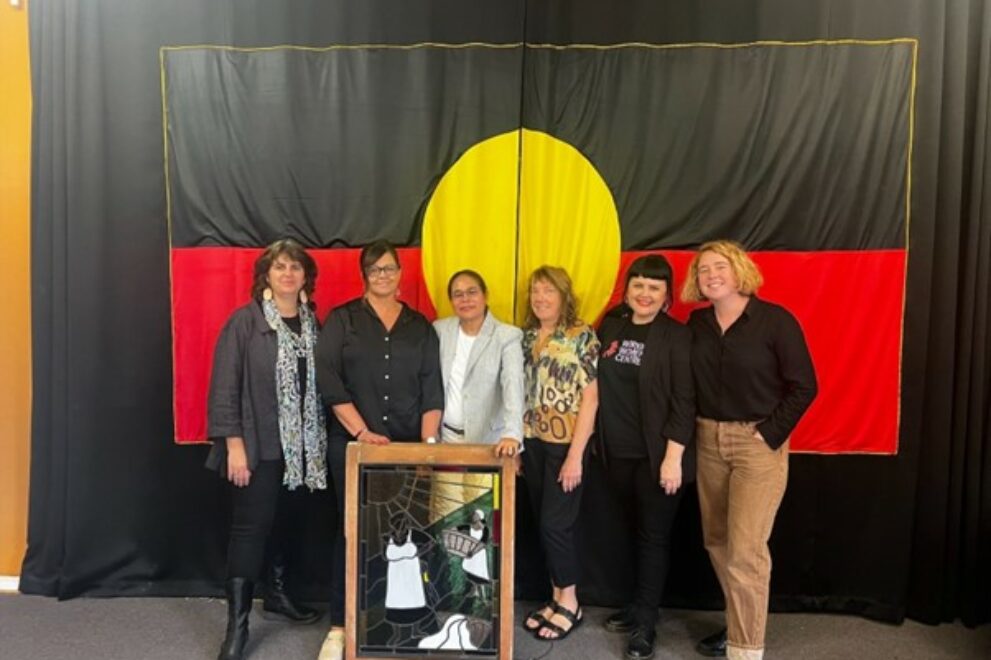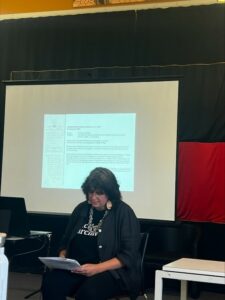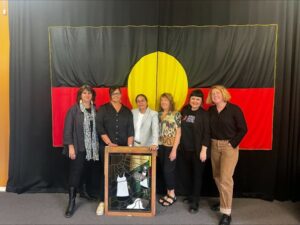Your cart is empty.


Your cart is empty.
27 Mar 2024 Campaigns

On 1 December 2023 the Working Women’s Centre SA hosted an event at Tadouni College in Port Adelaide on domestic servitude with keynote speakers Associate Professor Natalie Harkin and Elisabeth Lino de Araujo.
The event was attended by Kaurna, Ngarrindjeri, and Narungga Elders and activists, government officials, representatives of Aboriginal health, academics, union officials, APHEDA members, the Hon. Mira El Dannawi MLC, the Hon Steph Key, the Hon. Tammy Franks MCL and the Commissioner for Equal Opportunity, Jodeen Carney.
We received apologies from the Hon. Kyam Maher, Attorney General, the first Aboriginal Attorney-General in South Australia, as well as Minister for Aboriginal Affairs and Minister for Industrial Relations and the Public Sector. We also received apologies from the Hon. Katrine Hildyard MP, Minister for Women and the Hon. Natalie Cook MP, Minister for Human Services.
Associate Professor Natalie Harkin and Elisabeth Lino de Araujo shared their expertise, research and poetry on domestic servitude and advocacy of marginalised women. This event was an excellent demonstration of solidarity between Aboriginal and Timor Leste women as it presented the similarities between historical domestic servitude within our State, which makes up an under spoken element of Australia’s history, and domestic servitude that occurring in other parts of the world today, such as in Timor-Leste.

Associate Professor Natalie Harkin
Elisabeth Lino de Araujo is the founder of the Working Women’s Centre Timor-Leste (WWCTL) in Dili, Timor-Leste. From 2007 Elisabeth has worked as the Country Manager of Union Aid Abroad – APHEDA Timor Leste. Elizabeth presented on the incredible work that the WWCTL does, with a focus on advocacy for domestic and vulnerable female workers both in reaction to exploitation but in prevention. The Labour Code of Timor Leste was ratified by the Timorese Government in 2010, and the WWCTL has an outreach training workshop where they educate women on their rights at work in accordance with this legislation. We also heard Elisabeth present on another example of the fantastic advocacy of the WWCTL, on the proposed Special Law for Domestic Workers Bill in Timor Leste, which was drafted in 2017, and is awaiting promulgation. It was inspiring to hear about the WWCTL’s steadfast contribution to the formation of this Bill.
Associate Professor Natalie Harkin is a Narungga poet and Research Fellow at Flinders University living on Kaurna Yerta, South Australia. She engages archival-poetic methods to document community Memory Stories and is a member of SA’s inaugural State Records/State Library Aboriginal Reference Group. Her research centres on Aboriginal women’s domestic service and labour histories, and Indigenous Living-Legacy / Memory Story archiving innovations for our time.
Associate Professor Harkin presented on her research on historical domestic servitude of Aboriginal women and resulting stolen wages, of which the government in South Australia is yet to address. Further, she discussed the barriers in place for Aboriginal people to access their records through the State Archive today. An important underpinning theme of her work is the importance of the decolonisation of our state archives.
Leadlight artist and Narungga woman Sharene Vandenbroak kindly allowed the Working Women’s Centre SA to display her stain glass artwork at this event. Her artwork entitled ‘See Her Shining in the Sun’ was featured in the larger exhibition ‘APRON-SORROW / SOVEREIGN -TEA’ in 2021. Sharene’s set of gorgeous handmade stain glass windows depicting her strong female family members performing domestic labour received much praise and enhanced the story telling atmosphere of this event.

(Left to right) Associate Professor Natalie Harkin, Sharene Vandenbroak, Elisabeth Lino de Araujo, Anne-Marie Hayes, Nikki Candy, Abbey Kendall
Stolen Wages Work
The Working Women’s Centre SA organised this event as a result of meeting with multiple Aboriginal women and hearing their stories of work from the late 1950’s to late 1960’s. In acknowledgement of South Australia’s under recognised history of exploitation of Aboriginal workers, the WWC has been assisting several Aboriginal women to gain access to their records held in archives by the state government.
The racially motivated policies that existed in South Australia up until the 1970’s facilitated control and exploitation of Aboriginal workers. Resultingly, it was common for Aboriginal workers to not be paid, or to be paid small, intermittent amounts of money for the work they performed. The types of work that were common for Aboriginal workers to perform historically were domestic and pastoral work. The WWC is funded to provide legal advice to women and vulnerable workers, and in line with our funding, domestic servitude is feminised work. In a recent submission from the WWC to the state government on the proposal for South Australia to form a Human Rights Act, the WWC submitted to the inquiry that Aboriginal people should have the right to have timely access to records that relate to them. A copy of the WWC’s submission can be found here.
The WWC has been working with Associate Professor Natalie Harkin in advocating for archive accessibility and assisting Aboriginal women to request their own government records relating to their historical employment. This is often a lengthy process with multiple bureaucratic obstacles, which creates further barriers for Aboriginal people to access their own records relating to themselves and their families.
The WWC strongly supports and endorses the decolonisation of state records. Ensuring that Aboriginal people have timely and effortless access to their own records is an essential and crucial step towards truth telling and reconciliation of South Australia’s history of exploiting Aboriginal workers.
Other states and territories in Australia such as QLD, NT, NSW, WA and the NT have addressed historical stolen wages that occurred within their jurisdictions. South Australia is yet to address this issue.
The Working Women’s Centre SA would like to thank all who attended this highly successful event, and to further send a special thanks to both Elizabeth and Associate Professor Natalie Harkin for sharing their expertise. We look forward to continuing this collaboration and advocacy on these important issues with both Elizabeth and Associate Professor Natalie in the future.
The 16 June marks International Day of the Domestic Worker. You can read about Domestic Workers, here. We look forward to platforming domestic workers and both their historic and current rights in the coming year.
![]()